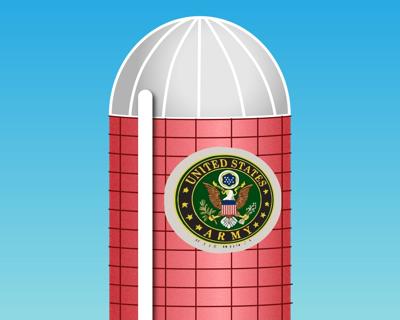At Fort Bragg, NC State’s Agricultural Institute is providing a new program for people transitioning from military service to the farming industry. A $150,000 grant from the Golden LEAF Foundation is funding the initiative, the first of its kind in the nation.
Veterans face elevated rates of unemployment when they come out of the military, as they obtain sets of skills that may contrast with what is expected from various industries. Program coordinator Robert Elliot thinks that this program can alleviate such issues by taking advantage of more transferable skills.
“We see a lot of interest from the veterans, because as they transition out of the military they don’t want to go work in a cubicle-type job or in an office,” Elliot said.
The six-week program teaches various agricultural skills to prepare service members for life after the Army. In North Carolina, agriculture is the leading industry in terms of employment, followed by the military. Elizabeth Wilson, director of NC State’s Agricultural Institute, felt there could be a connection between the two. She and her faculty came up with the idea of a “soldier-to-agriculture” program for folks nearing the end of their military service.
“Lots of [veterans] had gone through different kinds of training in the military,” Wilson said. “One person might be a logistics officer; they know how to ship things and get things moved. Well, that’s not a whole lot different than moving food. They have a lot of transferable skills.”
In addition to demanding similar skill sets, agricultural work includes some other similarities to serving in the military.
“Farming really appeals to a lot of veterans because it’s work that we can relate to,” Elliot said. “We’re already used to being outside and farming is more appealing to us than construction or day-labor.”
Service members can apply at Fort Bragg through the Career Resource Center. Once cleared by NC State and the Army, they can begin the transition to agriculture and farming education.
“They are released from their job duties for six weeks to come take our program, which is free to them,” Wilson said. “Then from there, they’re transitioning out to civilian life within six months.”
At Fort Bragg, soldiers enjoy free access to a high tunnel greenhouse as well as other agricultural tools and education.
“They learn basic agricultural skills,” Elliot said. “They learn what tractors are about and what various pieces of equipment are for. They learn about germination, hydroponics, greenhouse technology and lighting. They learn a lot of stuff.”
The program provides resources and networking opportunities for soldiers and their families as they transition from the military to the farm. The students have the opportunity to learn from each other in a hands-on environment, which translates favorably as former soldiers pursue agricultural work.
“The number-one skill that they come to us with is team-building,” Wilson said. “They’re used to being taught by each other instead of the faculty. They’re very team-oriented, they learn well from each other and that goes well in a job. That’s the number one ‘soft’ skill now that managers want.”
Those involved see the program as a success thus far. Twelve service members have completed the program. They are now transitioning into employment and further education.
Wilson added that transitioning can be tough for service members with families and responsibilities.
“Some of them at thirty and forty don’t want to go back and do chemistry, English and all these other things,” Wilson said. “They have families, and they want to get straight to work.”
To learn more, interested folks can visit the Military and Veteran Resource Center on the first floor of Witherspoon Student Center or contact Robert Elliot at [email protected].


(0) comments
Welcome to the discussion.
Log In
Keep it Clean. Please avoid obscene, vulgar, lewd, racist or sexually-oriented language.
PLEASE TURN OFF YOUR CAPS LOCK.
Don't Threaten. Threats of harming another person will not be tolerated.
Be Truthful. Don't knowingly lie about anyone or anything.
Be Nice. No racism, sexism or any sort of -ism that is degrading to another person.
Be Proactive. Use the 'Report' link on each comment to let us know of abusive posts.
Share with Us. We'd love to hear eyewitness accounts, the history behind an article.